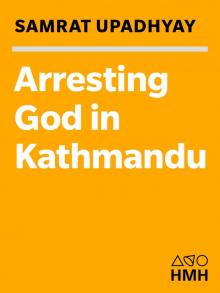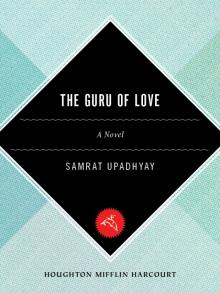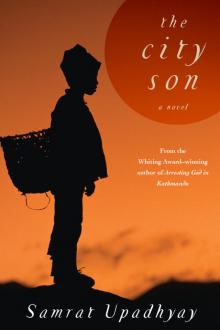- Home
- Samrat Upadhyay
The Guru of Love Page 2
The Guru of Love Read online
Page 2
“Without the tutees, how will we get out of this hellhole?” Ramchandra asked. “How will we ever build a house of our own?”
Goma put her index finger to her lips. Sanu, thirteen, and her brother, Rakesh, nine, were sleeping in the next room. But as if to support his argument, a horn blared outside, tires screeched, followed by a bang and the revving of an engine. Both Goma and Ramchandra instinctively closed their eyes.
“You can’t seem to utter a sentence without using the word hellhole these days,” Goma said.
“Well, what do you call this?” He waved a hand.
“I’m not unhappy here,” she said.
“Your parents are unhappy that you’re here.”
Over the years, he’d become more bold when speaking of her parents, even though he knew that his complaints made Goma uncomfortable. They had never taken a liking to Ramchandra, even though they had chosen him as their son-in-law. When Ramchandra and Goma got married, he was still living with his mother, in an even smaller flat in Thamel. At that time he was attending Tri Chandra College and, on the side, tutoring students, one of whom was Goma’s sister, Nalini.
The marriage proposal had come as a surprise, a few months after Nalini took the S.L.C. exam.
“The proposal is not for Nalini?” he’d asked his mother.
“No, it’s for her older sister.”
He’d seen Goma at her parents’ house only a few times, when she passed by the room where he was tutoring Nalini, but now he couldn’t recall her face clearly. He did remember noting that she was prettier than Nalini, who had a sad, deprived look.
“Why would they want to give their daughter to someone like me?” he asked his mother. Usually, he tutored his students in his small apartment, but the Pandeys had asked him to come to their house, and since they offered him a hundred rupees more than he usually got, he’d gone. He’d been intimidated by the grandeur of the house, by the stern look on Mr. Pandey’s face. But he needed the money, and he found Nalini an easy student to tutor.
His mother suggested that maybe his reputation as a bright student had led Goma’s parents to give their daughter to him, knowing that he was poor. Perhaps they believed that, with his intelligence, he’d soon occupy a position that was lucrative and that their daughter would live in luxury. Perhaps they were impressed by his behavior when he tutored their younger daughter. “This is a great honor for our family,” his mother had said. “Perhaps our hard days are over.”
At the time he married her, Ramchandra didn’t even know that Goma was his age. When his mother showed him her picture, he recalled her face more clearly, and a sweetness entered his heart, and he said yes. The age factor had never bothered him, and it didn’t bother him now, although he was annoyed whenever relatives referred to it, as if it were fundamentally wrong for the wife to be the same age as the husband. One relative had said, “Seven years’ difference; that’s the best. Our ancient texts say that a difference of seven years helps the harmony between the husband and wife.” The man had looked affectionately at his wife, who, exactly seven years younger, was chewing pan, which made the inside of her mouth bright red. She had established herself as a petty gossipmonger, belittling those who had less than she did. Ramchandra didn’t know which ancient texts the relative was referring to, but Hindu texts were often sprinkled with such petty advice. “I don’t believe in those rules and myths,” Ramchandra had replied, and the relative, still smiling at his wife, had said, “This is our culture.”
In moments of quiet Ramchandra did wonder why Goma hadn’t married earlier, when she was in her early twenties, when she could have been easily negotiated into a well-to-do family. Had she done something scandalous when she was young? he wondered. Although when he looked at his wife—the devotional tika on her forehead, her straightforward, sweet manner with him and their children—he knew that he was sinful in even thinking such things about her.
Ramchandra was in a classroom in the basement of a dark building, wearing his dirty dark-blue shorts and stained sky-blue shirt. Suddenly the teacher’s whip came slashing through the air and struck him across the face, where it became numbers, problems, and he couldn’t, no matter how hard he tried, solve them. The other students, in their recently laundered uniforms and ties, mocked him, and Ramchandra called for his mother, “Ama, ama,” and woke to discover that Rakesh was crying out for his mother from the next room. Goma, who usually awoke at the slightest noise, was fast asleep. Ramchandra hurried to the children’s room, but he didn’t turn on the light lest it disturb Sanu. She was awake, though, and said, “Ba, I think he had a nightmare.” Ramchandra sat beside Rakesh, who was whimpering, and stroked his hair, trying to calm him. Gradually, the boy became quiet and then asked, “Ba, what am I going to get for Dashain?”
“What do you want, my son?”
“A bicycle.”
“Bicycle is too expensive. How about a toy bicycle?”
Rakesh made a face. “All of my friends have bicycles.”
Ramchandra turned to Sanu. “And what do you want?”
“Nothing,” she said. Every day Sanu seemed to be growing more aware of the financial restrictions of her family. “And he doesn’t need a bicycle either.”
Rakesh started arguing with her, and, fearing that they’d wake Goma, Ramchandra raised his hand and said, “I can give you a nice story right now. Free of cost.”
“If he gets a bicycle, then I too need something big,” Sanu said.
“We’ll deal with that later,” Ramchandra said. “Now the story. In a distant land a long time ago there was a poor girl,” Ramchandra began. He spoke softly so that Goma wouldn’t wake up. The naked bulb hanging from the ceiling in the corridor revealed the outlines of his children.
This girl, Ramchandra continued, was seventeen years old and lived with her mother in a hut. The roof of the hut leaked in the monsoon rains, and the entire mud floor became flooded. They were so poor that they ate only one meal each day, usually in the evening by the fire, and the girl’s stomach rumbled during the night.
“Will this be a sad story?” Sanu asked.
“Maybe. Just listen.”
“What was her name? The girl?”
Ramchandra was stumped. Then he said, “Malati.”
“But Malati is your student,” Rakesh said.
“Do you want to hear the story or not?”
Rakesh became quiet, and Ramchandra continued. The girl always thought about her father, who had left the village a few years ago in search of a job in the city and had never returned. When she went to cut grass for their cow, whose milk they sold for money to get by, she stared out at the horizon, hoping to see her father return, his pockets filled with money and gifts of jewelry for her and her mother. Each night, as she lay on the mat on the floor where they slept, she listened for the knock on the door that would signal his arrival. In her dreams he would appear, well-fed and prosperous, in the city, missing his daughter.
One day, the richest merchant in the village came to their hut and asked the mother for her daughter’s hand in marriage. “Your daughter is very beautiful,” said the merchant, who had a long mustache, which trickled down his chin. “She is also a hard worker, so she will make a good wife.” The mother was delighted. In her mind she saw herself in a bright, gold-studded sari, wearing a diamond necklace, with five servants ready at her command. The girl was not happy. The merchant was her father’s age, and she didn’t like the way his eyes glinted when he looked at her.
Ramchandra didn’t know where to go from here, so he stopped, but the children pestered him to continue. “And they lived happily ever after,” he said.
“Who lived happily ever after?” Sanu asked. “The merchant and the girl? But she doesn’t like him! That’s no story.”
“Shhh, you’ll wake up Mother,” Ramchandra said. “We’ll continue tomorrow.” And despite their protests, he tucked them under the blanket and left.
In the next room, Goma was awake and bleary-eyed. “I was so
tired I didn’t even hear. Did Rakesh have a nightmare?”
“Yes, and I told him a story.”
“Which one?”
“I made one up.”
“About what?”
“Nothing.” He snuggled close to her. “It was a nonsense children’s story.”
2
MALATI DIDN’T APPEAR at the next session, and Ramchandra couldn’t focus on Ashok, who smiled and kept repeating, “I wonder what happened to that girl.” After he left, Ramchandra changed from his suruwal to his cotton pants, the ones he’d had tailored two years ago. They were already beginning to fray at the bottom, and Goma had been pestering him to have a new pair made, but he’d resisted, immediately calculating the cost: at least fifty rupees for the cloth, another fifty for the tailor. The shirt he wore had a hole in the chest, but Goma had darned it a few months ago, and people would have to look closely before they’d notice it. The ready-made, fine nylon shirt he had received from his inlaws during last year’s Dashain festival hung in the closet, unworn. He had fingered the fine cloth a few times, but had never put it on; this was the only way he could strike back at their criticism of his poverty. Just the other day, Mrs. Pandey had mentioned a schoolteacher, a relative, who had moved from a crummy school to a more prestigious one run by the wife of a well-known businessman. “When’s that going to happen to our son-in-law?” she said, not looking at Ramchandra but at Goma. And Mr. Pandey had said, as if Ramchandra weren’t present, “Keep dreaming, wife. It’s been so many years, and still nothing.”
He called to Goma in the kitchen that he was going for a walk, and before she could respond, he headed down the stairs, noticing that one wooden board creaked dangerously under his weight.
Malati had told him that she lived in the neighborhood of Tangal, right behind the Sunrise Boarding School, and Ramchandra began to walk in that direction. But it was already eight-thirty, and if he wanted to see her, get back home for lunch, and make it to school on time, he’d have to take a threewheeler. He contemplated turning back. What was the point of spending his hard-earned money on this girl? But he needed to see her, say something to her. He hailed a three-wheeler, in his head deducting the nearly seven rupees’ fare from his savings account, and gave the driver directions.
The wind whipped inside the small cab, and Ramchandra tightened the muffler around his face. The driver drove at breakneck speed, often missing bicycles and pedestrians by inches. Ramchandra leaned forward and shouted into the driver’s ear, “Slow down. What’s the hurry?”
“You think you’re the only passenger I’ll have today?” the driver said.
It was impossible to talk reasonably to anyone nowadays, thought Ramchandra. It wasn’t like this even ten years ago, when civility existed among the Kathmandu people. Within the last few years, the city had swollen to such a point that it was ready to explode. People from the hills and mountains to the north and the plains to the south were migrating here daily, trying to survive. The land in their villages didn’t yield good crops, and the rising inflation made it impossible for them to feed their families.
Because of the steady influx of migrants, the city’s skyline had become dotted with satellite dishes, and one couldn’t walk anywhere without inhaling fumes from three-wheelers and old, rickety buses. Ramchandra understood the suffering of these poor people, who’d had to abandon their villages and towns, but the result was that too many hands prodded, probed, and fed on the innards of Kathmandu. Soon only its carcass would remain. The other day he’d seen small huts that had sprouted up on the shore of the Bishnumati River, a sight he’d previously thought was limited to cities in India, like Bombay.
But—Ramchandra was bitter when he thought of it—the city was not his. He didn’t own a house; he didn’t even own a piece of land. He was no different from the driver of this threewheeler, who probably had to rush passengers to various destinations all day and then go to the small room in a squalid part of the city where his wife and kids waited for him.
In Putlisadak, the three-wheeler got tangled in traffic, and they had to wait for several minutes. Nearby, outside a shop, stood a long line of people, plastic containers in hand.
“Look at that,” the driver said. “These bastard Indians. This is all their doing.”
“Is that for kerosene?”
“Yes, what else? They’ve reopened the borders, but it’s going to take a while.”
“Well, at least it’s not as bad as it was before.”
“Well, Dashain is here, and people have a lot of cooking to do. All donkeys, these politicians. This hahakar, this chaos, just because our king and the Indian prime minister couldn’t stand each other’s egos.”
Whether there was any truth to that, Ramchandra didn’t know. Rumors had it that contest of one-upmanship between King Birendra and the Indian Prime Minister Rajiv Gandhi had led India to close most of its borders to Nepal. Supposedly each felt the other hadn’t shown him enough respect at political meetings. But most likely, Ramchandra thought, India was unhappy with King Birendra’s purchase of military hardware from China, not to mention the way Nepal now required Indian workers to obtain permits.
“Dhotis,” the three-wheeler driver cursed, spitting out his window onto the pavement. “They’ll suck this country dry.”
In the past few months, Ramchandra had heard similar sentiments expressed many times. Housewives lining up to buy kerosene cursed Rajiv Gandhi, and motorists fumed and blamed the Indians, “dhoti bhais,” while they sat in their cars waiting to be granted the ration of a few liters of petrol. Ramchandra had nothing against the Indians who worked in Nepal—he found most of them to be pleasant and hardworking. But it was true that the Indian government liked to flex its muscles toward its neighbors.
“Can’t live with them, can’t live without them,” Ramchandra said. Yet there was no doubt that the city was filled with growing anger. Fumes of resentment seemed to rise from the people and blend with the polluted air. As the residents of Kathmandu became more vocal in their criticism of the ruling one-party Panchayat establishment, the sense of defiance, long subdued, finally began to permeate the streets and alleys, where people openly discussed how Nepal needed radical reforms, like the ones that had brought down the Berlin Wall. The image of the lone Chinese man facing tanks in Tiananmen Square, shown on television and in newspapers, had excited people’s imagination. The banned political parties, it was said, were attempting to reconcile among themselves so that they could capitalize on this growing bitterness.
Of the three houses that stood behind the Sunrise Boarding School, only one had a chicken shed next to it. A mangy dog, tied with a rope on the unkempt lawn, followed Ramchandra’s steps to the door with jaundiced eyes. Chicken feathers drifted from the shed onto the veranda, and the chickens clucked in unison as he knocked on the door. A short woman with yellow eyes, not unlike the dog’s, opened the door. She wore a crumpled dhoti, and there were large white blots on her neck and forehead. It occurred to him that she was an albino.
“Tell Malati that her math teacher is here to see her, all right?” Ramchandra told the maid.
Immediately, he realized his mistake. If Malati was poor, it was unlikely that her family could afford a maid. Also, the woman’s authoritative stance, hand on hip, should have told him that she was not a maid. But she didn’t look like Malati’s mother; there was no resemblance.
“And who are you?” the woman asked.
“Ramchandra. I’m her math tutor.”
“What do you need to see her for? What do you need?”
He was surprised by the roughness of her words, which, combined with her pleasant voice, had an odd effect. A baby was crying inside.
“No, no,” he said. “She didn’t come to the last session, so I was wondering...”
“Do you go to all of your students’ houses when they don’t come?”
He didn’t respond. “All right, come inside,” she said, annoyance marking her face.
She led him past a
living room with a worn-out sofa, and into the kitchen, small and gloomy, with grease stains all over the walls. A yellowed poster of Goddess Laxmi, her many hands clasping her trident, conch shell, and lotus, was posted on a door in the corner. It was this door the woman opened. “Malati, someone here to see you. Says he’s your teacher.”
Once Ramchandra’s eyes adjusted to the semidarkness, he saw Malati sitting on the floor, her hair in disarray, a baby in her lap, one of her breasts peeking out of her blouse. The baby, who couldn’t have been more than a year old, was trying to find her nipple, but the wails indicated that it was having problems. Ramchandra noticed how small the room was—barely the size of a closet. Then it occurred to him that it was indeed a closet.
Malati, not looking up, continued to struggle with the baby, cooing, pushing its head gently to her breast.
“Imagine that,” the woman said with a laugh. “A teacher visiting his student’s home.”
“How are you, Malati?” Ramchandra asked.
Malati didn’t answer, but the woman did. “She is very fine, don’t you see? I told her to get rid of that baby when it was still in her womb, but did she listen? And now this.” She motioned toward Malati and the baby.
“Malekha Didi,” Malati said to the woman, “will you please be quiet? Your voice is disturbing Rachana.”
Didi. So, the woman was Malati’s sister? She hadn’t mentioned one, but didi could apply to anyone, even a stranger.
“Yes, I am the bad one now,” the woman said. “I have done so much for you, and, slut that you are, you don’t see what I’ve done.”
The word slut stung Ramchandra. Malati finally looked up at him with a faint smile, as if to say, see what you’ve gotten yourself into. Then she turned again to the baby, who had calmed down and whose eyelids were becoming heavier. “I’ll have to feed her Lactogen,” Malati said.

 Arresting God in Kathmandu
Arresting God in Kathmandu Mad Country
Mad Country The Guru of Love
The Guru of Love The City Son
The City Son